The PCB inspection microscope market is forecast to increase from USD 1.3 billion in 2025 to USD 2.3 billion by 2035, expanding at a CAGR of 5.7% and adding USD 1.0 billion in total value. The market will expand by 1.7X during this period, driven by the rising complexity of electronic assemblies, the miniaturization of components, and higher precision requirements in automotive electronics, medical devices, and consumer electronics manufacturing. Rapid integration of inspection systems into automated production platforms has positioned microscopes as essential tools in modern quality assurance frameworks. Between 2025 and 2030, global value will rise from USD 1.3 billion to USD 1.6 billion, representing 33.5% of total forecast growth, driven by optical microscope dominance and the increasing sophistication of defect detection systems used in mass electronics production.
From 2030 to 2035, industry growth from USD 1.6 billion to USD 2.3 billion will account for 66.5% of the decade’s expansion, as digital and electron microscope systems are increasingly deployed across smart factories and integrated inspection networks. The optical microscope category, holding roughly 60% share, continues to dominate due to proven reliability, advanced imaging clarity, and compatibility with existing manufacturing infrastructure. Automotive electronics applications account for 48% of the market, supported by zero-defect manufacturing requirements and stringent quality mandates. Medical device applications follow at 30%, demanding ultra-precise imaging and traceability compliance, while electronic manufacturing contributes 18%, with niche demand from telecom and consumer electronics sectors. China (7.7% CAGR) and India (7.1%) lead expansion through electronics manufacturing upgrades and government-backed quality programs. Germany (6.6%) and Brazil (6.0%) show sustained performance through automotive quality control and production standardization. The United States (5.4%), United Kingdom (4.8%), and Japan (4.3%) maintain growth through technological precision, regulatory compliance, and continued investment in high-end inspection infrastructure. Competition remains moderately concentrated, with Leica Microsystems, Microscope World, and Vision Engineering collectively holding over 40% share, emphasizing optical excellence and ergonomic precision. EVIDENT, TAGARNO, and Dino-Lite strengthen their market positions through digital imaging integration and advanced measurement analytics.
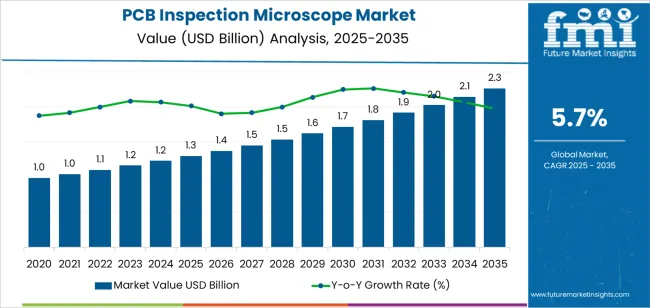
PCB Inspection Microscope Market Year-over-Year Forecast (2025-2035)
The latter half (2030-2035) will witness steady growth from USD 1.6 billion to USD 2.3 billion, representing an addition of USD 0.7 billion or 66.5% of the decade's expansion. This period will be defined by mass market penetration of specialized digital microscope designs, integration with comprehensive quality control platforms, and seamless compatibility with existing inspection infrastructure. The market trajectory signals fundamental shifts in how manufacturers approach defect detection optimization and quality management, with participants positioned to benefit from steady demand across multiple microscope types and application segments.
The market demonstrates distinct growth phases with varying market characteristics and competitive dynamics. Between 2025 and 2030, the market progresses through its technology adoption phase, expanding from USD 1.3 billion to USD 1.6 billion with steady annual increments averaging 5.7% growth. This period showcases the transition from basic inspection formulations to advanced optical microscope systems with enhanced defect detection capabilities and integrated quality control systems becoming mainstream features.
The 2025-2030 phase adds USD 0.3 billion to market value, representing 33.5% of total decade expansion. Market maturation factors include standardization of electronics inspection and manufacturing quality protocols, declining component costs for specialized microscopy formulations, and increasing industry awareness of defect detection benefits reaching optimal inspection effectiveness in automotive electronics and medical device applications. Competitive landscape evolution during this period features established microscopy manufacturers like Leica Microsystems and Vision Engineering expanding their PCB inspection portfolios while specialty manufacturers focus on advanced imaging development and enhanced resolution capabilities.
From 2030 to 2035, market dynamics shift toward advanced digital integration and global manufacturing expansion, with growth continuing from USD 1.6 billion to USD 2.3 billion, adding USD 0.7 billion or 66.5% of total expansion. This phase transition centers on specialized digital microscope systems, integration with automated inspection networks, and deployment across diverse automotive and electronic manufacturing scenarios, becoming standard rather than specialized applications. The competitive environment matures with focus shifting from basic inspection capability to comprehensive quality optimization systems and integration with production monitoring platforms.
| Metric | Value |
|---|---|
| Market Value (2025) | USD 1.3 billion |
| Market Forecast (2035) | USD 2.3 billion |
| Growth Rate | 5.7% CAGR |
| Leading Technology | Optical Microscope Microscope Type |
| Primary Application | Automotive Electronics Application Segment |
The market demonstrates strong fundamentals with optical microscope systems capturing a dominant share through advanced inspection design and quality optimization capabilities. Automotive electronics applications drive primary demand, supported by increasing quality control requirements and precision inspection technology needs. Geographic expansion remains concentrated in developed markets with established electronics infrastructure, while emerging economies show accelerating adoption rates driven by manufacturing expansion and rising quality standards.
Market expansion rests on three fundamental shifts driving adoption across the automotive electronics, medical devices, and electronic manufacturing sectors. First, quality control demand creates compelling operational advantages through PCB inspection microscopes that provide immediate defect detection and component verification without compromising production goals, enabling manufacturers to meet stringent quality standards while maintaining inspection productivity and reducing defect rates. Second, manufacturing modernization accelerates as electronics facilities worldwide seek advanced inspection systems that complement traditional quality processes, enabling precise defect identification and quality control that align with industry standards and manufacturing regulations.
Third, miniaturization advancement drives adoption from electronics manufacturers and assembly operations requiring effective inspection solutions that maximize defect detection while maintaining operational efficiency during component placement and soldering verification operations. Growth faces headwinds from equipment cost challenges that vary across microscope suppliers regarding the sourcing of optical components and imaging sensors, which may limit adoption in cost-sensitive manufacturing environments. Technical limitations also persist regarding field of view considerations and depth of focus concerns that may reduce effectiveness in multilayer PCB or complex assembly scenarios, which affect inspection performance and operational requirements.
The PCB inspection microscope market represents a specialized yet critical quality control opportunity driven by expanding global electronics production, manufacturing quality modernization, and the need for superior defect detection in diverse inspection applications. As manufacturers worldwide seek to achieve optimal inspection accuracy, reduce defect escape rates, and integrate advanced microscopy systems with automated platforms, PCB inspection microscopes are evolving from basic visual aids to sophisticated quality assurance solutions ensuring manufacturing excellence and reliability leadership.
The market's growth trajectory from USD 1.3 billion in 2025 to USD 2.3 billion by 2035 at a 5.7% CAGR reflects fundamental shifts in electronics quality requirements and precision inspection optimization. Geographic expansion opportunities are particularly pronounced in Asia Pacific markets, while the dominance of optical microscope systems and automotive electronics applications provides clear strategic focus areas.
Strengthening the dominant optical microscope segment through enhanced imaging formulations, superior resolution, and automated inspection systems. This pathway focuses on optimizing optical design, improving magnification capabilities, extending operational effectiveness to optimal defect detection rates, and developing specialized configurations for diverse PCB types. Market leadership consolidation through advanced optical engineering and automated inspection integration enables premium positioning while defending competitive advantages against alternative technologies. Expected revenue pool: USD 280.0-380.0 million
Rapid electronics manufacturing and assembly growth across Asia Pacific creates substantial expansion opportunities through local production capabilities and technology transfer partnerships. Growing PCB production volumes and government quality initiatives drive steady demand for advanced inspection microscope systems. Localization strategies reduce import costs, enable faster technical support, and position companies advantageously for procurement programs while accessing growing domestic electronics markets. Expected revenue pool: USD 240.0-325.0 million
Expansion within the dominant automotive electronics segment (48.0% market share) through specialized microscope designs addressing stringent quality standards and high-volume inspection requirements. This pathway encompasses automated inspection systems, quality control integration, and compatibility with diverse PCB assembly processes. Premium positioning reflects superior defect detection and comprehensive quality compliance supporting modern automotive manufacturing operations. Expected revenue pool: USD 220.0-300.0 million
Strategic expansion into medical device applications (30.0% market share) requires enhanced inspection capabilities and specialized microscope configurations addressing medical quality operational requirements. This pathway addresses regulatory compliance, precision component verification, and reliability assurance with advanced imaging engineering for demanding quality standards. Premium pricing reflects specialized inspection requirements and extended validation standards. Expected revenue pool: USD 180.0-245.0 million
Development of specialized PCB inspection microscope formulations for electronic manufacturing applications (18.0% share) and other segments (4.0%), addressing specific inspection requirements and niche quality demands. This pathway encompasses consumer electronics designs, industrial control systems, and cost-effective alternatives for emerging manufacturing segments. Technology differentiation through proprietary imaging enables diversified revenue streams while reducing dependency on single application platforms. Expected revenue pool: USD 140.0-190.0 million
Expansion of digital microscope segment (28.0% market share) through enhanced imaging properties, digital documentation advantages, and specialized measurement requirements. This pathway encompasses image analysis integration, remote inspection capabilities, and advanced formulations requiring superior digital imaging characteristics. Market development through advanced technology enables differentiated positioning while accessing premium markets requiring highest-capability inspection solutions. Expected revenue pool: USD 200.0-270.0 million
Development of electron microscope systems addressing specialized ultra-high resolution and nanoscale inspection requirements across automotive and medical device applications. This pathway encompasses failure analysis applications, research-grade inspection, and comprehensive analytical documentation. Premium positioning reflects technology leadership and analytical expertise while enabling access to research-focused procurement programs and advanced-capability requirements. Expected revenue pool: USD 120.0-165.0 million
Primary Classification: The market segments by microscope type into Optical Microscope, Electron Microscope, Digital Microscope, and Others categories, representing the evolution from basic inspection platforms to specialized imaging solutions for comprehensive quality optimization.
Secondary Classification: Application segmentation divides the market into Automotive Electronics, Medical Devices, Electronic Manufacturing, and Others sectors, reflecting distinct requirements for inspection precision, defect detection capacity, and quality assurance standards.
Regional Classification: Geographic distribution covers Asia Pacific, Europe, North America, and other regions, with developed markets leading adoption while emerging economies show accelerating growth patterns driven by electronics expansion programs.
The segmentation structure reveals technology progression from standard optical-based formulations toward specialized digital systems with enhanced imaging and documentation capabilities, while application diversity spans from automotive electronics operations to specialized medical device and consumer electronics applications requiring precise defect detection solutions.
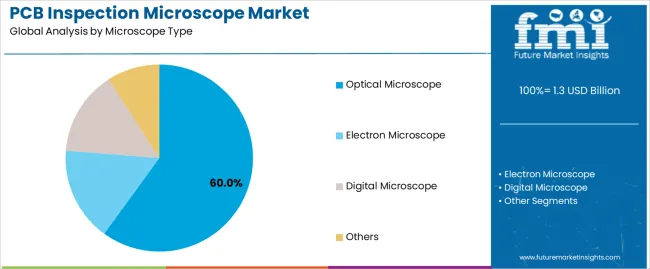
Market Position: Optical microscope systems command the leading position in the market with approximately 60.0% market share through advanced imaging properties, including superior visual clarity, reliable defect detection capability, and operational optimization that enable manufacturers to achieve optimal inspection precision across diverse automotive electronics and medical device environments.
Value Drivers: The segment benefits from manufacturer preference for reliable inspection systems that provide consistent defect detection, reduced false rejection rates, and operator compatibility without requiring significant training modifications. Advanced optical features enable ergonomic inspection integration systems, image consistency, and compatibility with existing quality equipment, where microscope performance and detection reliability represent critical quality requirements.
Competitive Advantages: Optical microscope systems differentiate through proven resolution standards, consistent optical characteristics, and integration with automated inspection systems that enhance quality effectiveness while maintaining optimal precision suitable for diverse PCB inspection applications.
Key market characteristics:
Digital microscope systems maintain advanced positioning in the market with approximately 28.0% market share due to their digital documentation properties and measurement integration advantages. These systems appeal to manufacturers requiring image capture capabilities with superior performance for quality documentation applications. Market adoption is driven by Industry 4.0 expansion, focusing digital inspection solutions and data integration through optimized digital microscope systems while maintaining superior analytical effectiveness standards.
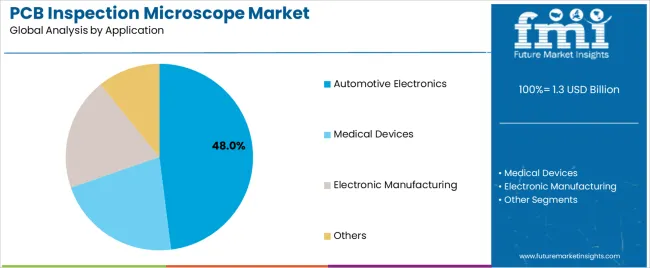
Market Context: Automotive electronics applications dominate the market with approximately 48.0% market share due to widespread adoption of quality inspection systems and increasing focus on defect prevention, reliability assurance, and zero-defect manufacturing applications that minimize failure rates while maintaining automotive standards.
Appeal Factors: Automotive manufacturers prioritize inspection reliability, defect detection consistency, and integration with existing quality infrastructure that enables coordinated microscope application across multiple PCB assembly lines. The segment benefits from substantial automotive investment and quality assurance programs that emphasize the acquisition of inspection microscopes for defect prevention and reliability verification applications.
Growth Drivers: Automotive electronics expansion programs incorporate PCB inspection microscopes as standard equipment for quality operations, while zero-defect requirements increase demand for precision inspection capabilities that comply with automotive standards and minimize field failures.
Market Challenges: Varying automotive standards and PCB complexity differences may limit inspection standardization across different assembly facilities or production scenarios.
Application dynamics include:
Medical device applications capture approximately 30.0% market share through specialized inspection requirements in medical electronics manufacturing, implantable device production, and diagnostic equipment applications. These facilities demand robust inspection systems capable of regulatory compliance while providing accurate defect detection and traceability capabilities.
Electronic manufacturing applications account for approximately 18.0% market share, while other segments capture 4.0%, including consumer electronics, telecommunications equipment, and specialty industrial applications requiring PCB inspection capabilities for quality control and process optimization.
Growth Accelerators: Electronics miniaturization expansion drives primary adoption as PCB inspection microscopes provide superior defect detection capabilities that enable manufacturing facilities to meet stringent quality standards without excessive inspection costs, supporting production operations and zero-defect missions that require precise component verification applications. Quality infrastructure demand accelerates market expansion as electronics manufacturers seek effective precision systems that minimize defect escape rates while maintaining inspection effectiveness during assembly verification and rework scenarios. Manufacturing investment increases worldwide, creating steady demand for inspection systems that complement traditional quality processes and provide defect prevention in competitive electronics markets.
Growth Inhibitors: Equipment cost challenges vary across microscope suppliers regarding the sourcing of optical components and imaging sensors, which may limit operational flexibility and market penetration in regions with budget constraints or cost-sensitive manufacturing operations. Technical performance limitations persist regarding field of view considerations and depth of focus that may reduce effectiveness in multilayer PCB, fine-pitch components, or three-dimensional inspection conditions, affecting microscopy versatility and application requirements. Market fragmentation across multiple quality standards and inspection protocols creates compatibility concerns between different microscope specifications and existing manufacturing infrastructure.
Market Evolution Patterns: Adoption accelerates in automotive electronics and medical device sectors where quality assurance justifies microscope costs, with geographic concentration in developed markets transitioning toward mainstream adoption in emerging economies driven by electronics expansion and quality awareness. Technology development focuses on enhanced imaging formulations, improved digital integration, and compatibility with automated optical inspection systems that optimize defect detection and inspection effectiveness. The market could face disruption if alternative inspection technologies or artificial intelligence-based visual inspection innovations significantly limit the deployment of microscope-based inspection in electronics applications, though PCB inspection microscopes' unique combination of precision visualization, operator control, and verification reliability continues to make them preferred in quality-critical applications.
The market demonstrates varied regional dynamics with Growth Leaders including China (7.7% CAGR) and India (7.1% CAGR) driving expansion through manufacturing capacity additions and electronics production programs. Steady Performers encompass Germany (6.6% CAGR), Brazil (6.0% CAGR), and United States (5.4% CAGR), benefiting from established electronics infrastructure and advanced quality adoption. Mature Markets feature United Kingdom (4.8% CAGR) and Japan (4.3% CAGR), where specialized automotive electronics applications and precision inspection integration support consistent growth patterns.
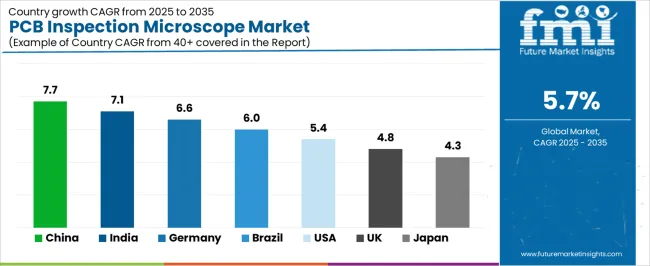
| Country | CAGR (2025-2035) |
|---|---|
| China | 7.7% |
| India | 7.1% |
| Germany | 6.6% |
| Brazil | 6.0% |
| United States | 5.4% |
| United Kingdom | 4.8% |
| Japan | 4.3% |
Regional synthesis reveals Asia Pacific markets leading adoption through electronics manufacturing expansion and quality control infrastructure development, while European countries maintain steady expansion supported by precision inspection technology advancement and automotive standardization requirements. North American markets show moderate growth driven by automotive electronics applications and quality integration trends.
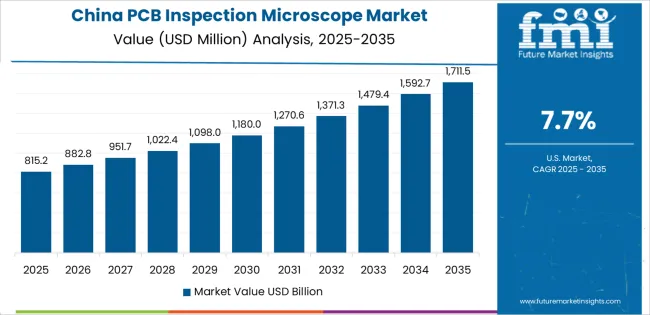
The Chinese market emphasizes advanced inspection features, including precision defect detection control and integration with comprehensive manufacturing platforms that manage quality assurance, production optimization, and electronics assembly applications through unified inspection systems. The country demonstrates strong growth at 7.7% CAGR, driven by electronics manufacturing expansion, quality control initiatives, and emerging production facility development that support PCB inspection microscope integration. Chinese manufacturers prioritize inspection effectiveness with PCB inspection microscopes delivering consistent defect detection through advanced imaging capabilities and quality adaptation features.
Technology deployment channels include major electronics facilities, specialized microscopy suppliers, and manufacturing procurement programs that support professional applications for complex PCB inspection and component verification applications. Manufacturing platform integration capabilities with established quality systems expand market appeal across diverse inspection requirements seeking defect detection precision and automation benefits. The expanding electronics base and accelerating automotive sector create steady demand, while innovative applications in smart manufacturing centers and automated assembly facilities open new growth avenues.
Performance Metrics:
Germany's advanced manufacturing market demonstrates sophisticated PCB microscope deployment with documented inspection effectiveness in automotive electronics applications and quality control facilities through integration with existing inspection systems and manufacturing infrastructure. The country leverages engineering expertise in precision optics and quality systems integration to maintain strong growth at 6.6% CAGR. Manufacturing centers, including Stuttgart, Munich, and Wolfsburg, showcase precision installations where PCB microscope systems integrate with comprehensive quality platforms and production management systems to optimize inspection operations and defect detection effectiveness.
German manufacturers prioritize system precision and quality compliance in microscope development, creating demand for advanced inspection systems with superior features, including digital documentation and automated measurement systems. The market benefits from established automotive infrastructure and a willingness to invest in precision inspection technologies that provide long-term quality benefits and compliance with international automotive and quality standards.
Market Intelligence Brief:
The USA market demonstrates sophisticated deployment across automotive applications with documented effectiveness in quality inspection and reliability verification facilities through integration with comprehensive manufacturing systems and quality control infrastructure. The country leverages advanced manufacturing capabilities in quality innovation and inspection technologies to maintain moderate growth at 5.4% CAGR. Manufacturing centers, including Detroit, Silicon Valley, and Austin, showcase advanced installations where PCB microscope systems integrate with comprehensive quality platforms and production management networks to optimize inspection efficiency and defect detection accuracy.
American manufacturers prioritize quality innovation and inspection precision in microscope development, creating demand for advanced inspection systems with superior features, including digital integration and automated measurement systems. The market benefits from established electronics infrastructure and willingness to invest in innovation technologies that provide long-term quality benefits and compliance with automotive and medical device standards.
Market Intelligence Brief:
The UK market demonstrates advanced quality deployment with documented inspection effectiveness in automotive electronics applications and manufacturing facilities through integration with existing quality systems and production infrastructure. The country leverages regulatory expertise in quality standards and manufacturing systems integration to maintain steady growth at 4.8% CAGR. Manufacturing centers, including Birmingham, Cambridge, and Manchester, showcase precision installations where PCB microscope systems integrate with comprehensive quality platforms and inspection management systems to optimize regulatory compliance and defect detection effectiveness.
British manufacturers prioritize system quality and regulatory compliance in microscope development, creating demand for certified inspection systems with advanced features, including traceability tracking and quality integration. The market benefits from established electronics infrastructure and commitment to invest in quality technologies that provide long-term inspection benefits and compliance with UK and automotive standards. Automotive electronics applications, medical device systems, and quality assurance programs drive diversified demand across multiple inspection segments.
Strategic Market Indicators:
India's market demonstrates rapid expansion deployment with documented inspection effectiveness in manufacturing applications and assembly facilities through integration with emerging production systems and quality infrastructure. The country leverages growing manufacturing capabilities in electronics production and quality systems integration to achieve high growth at 7.1% CAGR. Manufacturing centers, including Bangalore, Pune, and Chennai, showcase expanding installations where PCB microscope systems integrate with comprehensive quality platforms and production networks to optimize market penetration and inspection effectiveness.
Indian manufacturers prioritize inspection precision and quality standards in microscope development, creating demand for reliable inspection systems with advanced features, including automated integration and defect detection systems. The market benefits from expanding electronics infrastructure and willingness to invest in international-standard quality technologies that provide inspection optimization and compliance with global manufacturing standards.
Market Intelligence Brief:
Japan's market demonstrates precision deployment with documented inspection effectiveness in advanced automotive electronics applications and specialized manufacturing facilities through integration with sophisticated quality systems and inspection infrastructure. The country leverages engineering excellence in precision optics and quality systems integration to maintain steady growth at 4.3% CAGR. Manufacturing centers, including Tokyo, Nagoya, and Osaka, showcase precision installations where PCB microscope systems integrate with comprehensive quality platforms and production management systems to optimize inspection excellence and defect detection effectiveness.
Japanese manufacturers prioritize system precision and inspection excellence in microscope development, creating demand for ultra-high-resolution inspection systems with advanced features, including optical precision capabilities and quality integration systems. The market benefits from established automotive infrastructure and commitment to invest in highest-quality inspection technologies that provide superior manufacturing performance and compliance with stringent Japanese quality standards.
Strategic Market Indicators:
Brazil's market demonstrates expanding deployment with documented inspection effectiveness in automotive electronics applications and manufacturing facilities through integration with developing production systems and quality infrastructure. The country leverages manufacturing growth capabilities in electronics expansion and quality systems development to achieve growth at 6.0% CAGR. Manufacturing centers, including Sao Paulo, Manaus, and Campinas, showcase growing installations where PCB microscope systems integrate with quality platforms and production operations to optimize manufacturing development and inspection effectiveness.
Brazilian manufacturers prioritize inspection reliability and cost-effectiveness in microscope development, creating demand for dependable inspection systems with practical features, including quality integration and defect monitoring systems. The market benefits from expanding electronics infrastructure and investment in manufacturing technologies that provide quality improvement and compliance with emerging automotive standards.
Market Intelligence Brief:
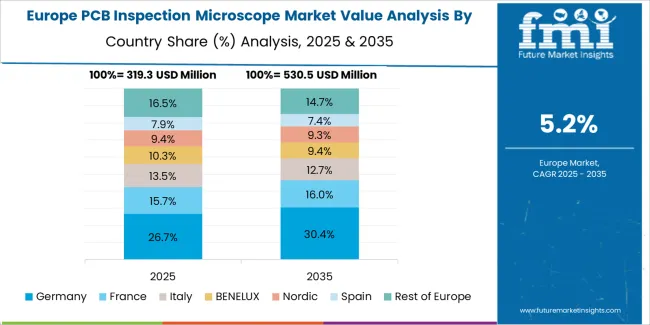
The PCB Inspection Microscope market in Europe is projected to grow substantially over the forecast period, with Germany expected to maintain its leadership position with a significant market share supported by its advanced automotive infrastructure and major manufacturing centers in Stuttgart and Munich. United Kingdom follows with strong market presence, driven by comprehensive quality assurance programs and precision inspection initiatives. France holds substantial market share through specialized automotive electronics activities, manufacturing applications, and production facility expansion. Italy commands notable market presence through strong automotive and electronics projects. Spain accounts for growing market share aided by manufacturing expansion and quality adoption. The Netherlands maintains steady share driven by specialty electronics applications and quality automation demand. The Rest of Europe region is anticipated to show steady adoption, reflecting consistent growth in Nordic countries, manufacturing expansion in Central European markets, and quality upgrades across Eastern European electronics facilities.
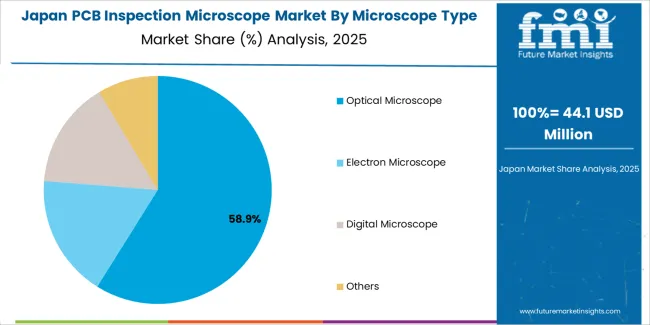
In Japan, the market prioritizes optical microscope systems, which capture the dominant share of automotive electronics and manufacturing installations due to their advanced features, including precision optical optimization and seamless integration with existing quality infrastructure. Japanese manufacturers emphasize reliability, precision, and long-term inspection excellence, creating demand for optical microscope systems that provide consistent defect detection capabilities and superior inspection performance based on quality requirements and automotive standards. Digital microscope maintains secondary positions primarily in documentation-intensive applications and measurement installations where digital integration functionality meets operational requirements without compromising inspection reliability.
Market Characteristics:
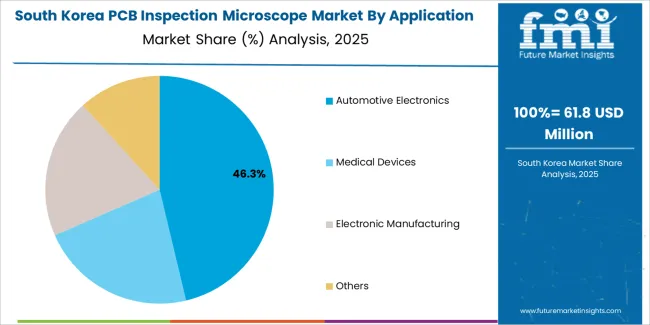
In South Korea, the market structure favors international microscopy manufacturers, including Leica Microsystems, Microscope World, and Vision Engineering, which maintain dominant positions through comprehensive product portfolios and established electronics networks supporting both automotive electronics and consumer electronics installations. These providers offer integrated solutions combining advanced PCB inspection systems with professional training services and ongoing technical support that appeal to Korean manufacturers seeking reliable precision inspection systems. Local equipment distributors and quality service providers capture moderate market share by providing localized service capabilities and competitive pricing for standard microscope installations, while domestic manufacturers focus on specialized applications and cost-effective solutions tailored to Korean electronics market characteristics.
Channel Insights:
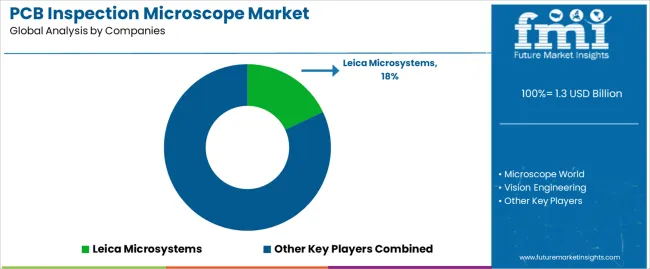
The market operates with moderate concentration, featuring approximately 15-17 meaningful participants, where leading companies control roughly 40-45% of the global market share through established manufacturing relationships and comprehensive microscopy portfolios. Competition emphasizes advanced imaging capabilities, optical quality, and inspection integration rather than price-based rivalry. The leading company, Leica Microsystems, commands approximately 18.0% market share through its extensive precision microscope product line and global manufacturing presence.
Market Leaders encompass Leica Microsystems, Microscope World, and Vision Engineering, which maintain competitive advantages through extensive optical expertise, global electronics networks, and comprehensive quality integration capabilities that create customer loyalty and support premium pricing. These companies leverage decades of microscopy experience and ongoing innovation investments to develop advanced PCB inspection systems with precision imaging control and ergonomic features. Technology Innovators include EVIDENT, TAGARNO, and JB Microscope, which compete through specialized imaging technology focus and innovative digital capabilities that appeal to manufacturers seeking advanced inspection solutions and quality differentiation.
These companies differentiate through rapid product development cycles and specialized electronics application focus. Regional Specialists feature microscopy manufacturers focusing on specific geographic markets and specialized applications, including automated inspection systems and integrated quality solutions. Market dynamics favor participants that combine reliable optical formulations with advanced imaging capabilities, including precision defect detection and digital documentation features. Competitive pressure intensifies as traditional microscopy suppliers expand into PCB inspection systems, while specialized quality equipment companies challenge established players through innovative digital solutions and automated platforms targeting automotive electronics and medical device segments.
| Item | Value |
|---|---|
| Quantitative Units | USD 1.3 billion |
| Microscope Type | Optical Microscope, Electron Microscope, Digital Microscope, Others |
| Application | Automotive Electronics, Medical Devices, Electronic Manufacturing, Others |
| Regions Covered | Asia Pacific, Europe, North America, Latin America, Middle East & Africa |
| Countries Covered | China, India, Germany, Brazil, United States, United Kingdom, Japan, and 20+ additional countries |
| Key Companies Profiled | Leica Microsystems, Microscope World, Vision Engineering, EVIDENT, TAGARNO, JB Microscope, Dino-Lite, AmScope, LINK HAMSON, Ray PCB, Visus Technology, YSC Technologies, SANXO, Radical Scientific, ExportersIndia |
| Additional Attributes | Dollar sales by microscope type and application categories, regional adoption trends across Asia Pacific, Europe, and North America, competitive landscape with microscopy manufacturers and quality equipment suppliers, manufacturer preferences for precision and inspection reliability, integration with quality platforms and production monitoring systems, innovations in digital imaging formulations and optical excellence, and development of automated inspection solutions with enhanced performance and defect detection optimization capabilities. |
The global PCB inspection microscope market is estimated to be valued at USD 1.3 billion in 2025.
The market size for the PCB inspection microscope market is projected to reach USD 2.3 billion by 2035.
The PCB inspection microscope market is expected to grow at a 5.7% CAGR between 2025 and 2035.
The key product types in PCB inspection microscope market are optical microscope, electron microscope, digital microscope and others.
In terms of application, automotive electronics segment to command 48.0% share in the PCB inspection microscope market in 2025.






Full Research Suite comprises of:
Market outlook & trends analysis
Interviews & case studies
Strategic recommendations
Vendor profiles & capabilities analysis
5-year forecasts
8 regions and 60+ country-level data splits
Market segment data splits
12 months of continuous data updates
DELIVERED AS:
PDF EXCEL ONLINE
PCB Design Software Industry Analysis in Europe Size and Share Forecast Outlook 2025 to 2035
PCB Connector Market Size and Share Forecast Outlook 2025 to 2035
PCB Design Software Market Analysis by Component, Deployment, Application, and Region Through 2035
PCB Vision Inspection Equipment for SMT Market Size and Share Forecast Outlook 2025 to 2035
Multi-Axis PCB Drilling Machine Market Size and Share Forecast Outlook 2025 to 2035
Rigid-Flex PCB Market Size and Share Forecast Outlook 2025 to 2035
Substrate-like PCB Market Size and Share Forecast Outlook 2025 to 2035
Printed Circuit Board (PCB) Assembly Market Size and Share Forecast Outlook 2025 to 2035
Printed Circuit Boards (PCB) Market Trends - Demand & Forecast 2025 to 2035
Industrial Water Chiller for PCB Market Size and Share Forecast Outlook 2025 to 2035
Inspection Drone in Oil and Gas Market Size and Share Forecast Outlook 2025 to 2035
Inspection Management Software Market Size and Share Forecast Outlook 2025 to 2035
Inspection Robots Market Size and Share Forecast Outlook 2025 to 2035
Inspection and Inventory Labels Market Size and Share Forecast Outlook 2025 to 2035
Inspection Lighting Fixture Market Size and Share Forecast Outlook 2025 to 2035
Inspection & Weighing Machine Industry Analysis in ASEAN and Gulf Countries Analysis - Size, Share, and Forecast 2025 to 2035
Examining Market Share Trends in Inspection and Inventory Labels
Inspection Machines Market Growth – Trends & Forecast 2025 to 2035
Bar Inspection System Market Size and Share Forecast Outlook 2025 to 2035
Tire Inspection System Market - Outlook 2025 to 2035

Thank you!
You will receive an email from our Business Development Manager. Please be sure to check your SPAM/JUNK folder too.
Chat With
MaRIA